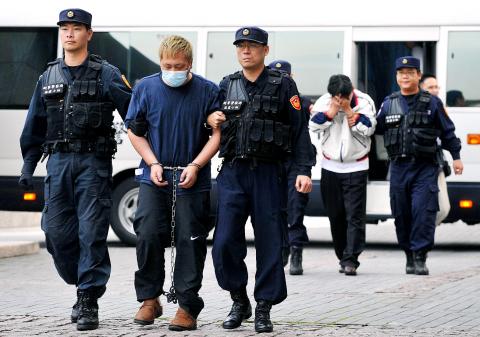Two men suspected of planting suitcase explosive devices on a high-speed rail train and near a lawmaker’s office on Friday last week were repatriated from China yesterday, investigators said.
Investigators made the announcement at a press conference presided over by National Police Agency Director-General Wang Cho-chiun (王卓鈞) yesterday afternoon.
Police said that the two men, surnamed Chu (朱) and Hu (胡), were apprehended and repatriated under the Cross-Strait Agreement on Joint Crime-Fighting and Judicial Mutual Assistance, and arrived at Taiwan Taoyuan International Airport at about 3:30pm under police escort.

Photo: Mandy Cheng, AFP
The pair left for Macau at about 4pm on Friday, just hours after they allegedly planted explosives on a high-speed rail train traveling from Greater Kaohsiung to Taipei, as well as outside Chinese Nationalist Party (KMT) Legislator Lu Chia-chen’s (廬嘉辰) constituency office in New Taipei City (新北市), police said.
The suitcases contained gasoline, electric detonators and timers, with some holding gas cartridges, hydrochloric acid and sodium cyanide, police said.
Preliminary investigations indicated that Chu was in charge of planting the suitcases, while Hu was thought to be responsible for driving Chu to the locations and manufacturing the explosive devices, Wang said.
He said that Chu had confessed to the allegations made against him and had given a statement while being questioned by Chinese police, but Hu, a lawyer from Greater Taichung, had denied any involvement in the case.
Although police had suspected the incidents could be politically motivated because a note that included President Ma Ying-jeou’s (馬英九) name had been attached to the suitcases outside Lu’s office, no evidence has been uncovered to suggest politics were a motive, Wang said.
Investigators identified Hu as a possible suspect on Friday night after DNA traces collected from the suitcases pointed to him, only to realize that he had boarded a flight to Macau earlier that day, Wang said.
After contacting the Macau police, investigators found that Hu had gone to Zhuhai City in Guangdong Province at 7pm on Friday, Wang said.
Wang said investigators named Chu as an accomplice after fingerprints collected from a minivan that was used to transport the suitcases reportedly matched Chu’s and because he had been on the same flight to Macau as Hu.
“We then immediately activated the cross-strait crime-fighting mechanism to alert Chinese police so they could apprehend the pair,” Wang said.
The men were arrested in a hotel in Zhongshan City, Guangdong Province, at about 1am on Sunday, he said.
Huang Chi-chih (黃繼智), director of the Criminal Investigation Bureau’s 5th Investigation Brigade and a specialist in bomb prevention, said the suspects could have learned to make explosives from the Internet.
“Although the explosives were crudely made, they could still have caused devastating damage had they been detonated,” Huang said.

The CIA has a message for Chinese government officials worried about their place in Chinese President Xi Jinping’s (習近平) government: Come work with us. The agency released two Mandarin-language videos on social media on Thursday inviting disgruntled officials to contact the CIA. The recruitment videos posted on YouTube and X racked up more than 5 million views combined in their first day. The outreach comes as CIA Director John Ratcliffe has vowed to boost the agency’s use of intelligence from human sources and its focus on China, which has recently targeted US officials with its own espionage operations. The videos are “aimed at

STEADFAST FRIEND: The bills encourage increased Taiwan-US engagement and address China’s distortion of UN Resolution 2758 to isolate Taiwan internationally The Presidential Office yesterday thanked the US House of Representatives for unanimously passing two Taiwan-related bills highlighting its solid support for Taiwan’s democracy and global participation, and for deepening bilateral relations. One of the bills, the Taiwan Assurance Implementation Act, requires the US Department of State to periodically review its guidelines for engagement with Taiwan, and report to the US Congress on the guidelines and plans to lift self-imposed limitations on US-Taiwan engagement. The other bill is the Taiwan International Solidarity Act, which clarifies that UN Resolution 2758 does not address the issue of the representation of Taiwan or its people in

US Indo-Pacific Commander Admiral Samuel Paparo on Friday expressed concern over the rate at which China is diversifying its military exercises, the Financial Times (FT) reported on Saturday. “The rates of change on the depth and breadth of their exercises is the one non-linear effect that I’ve seen in the last year that wakes me up at night or keeps me up at night,” Paparo was quoted by FT as saying while attending the annual Sedona Forum at the McCain Institute in Arizona. Paparo also expressed concern over the speed with which China was expanding its military. While the US

SHIFT: Taiwan’s better-than-expected first-quarter GDP and signs of weakness in the US have driven global capital back to emerging markets, the central bank head said The central bank yesterday blamed market speculation for the steep rise in the local currency, and urged exporters and financial institutions to stay calm and stop panic sell-offs to avoid hurting their own profitability. The nation’s top monetary policymaker said that it would step in, if necessary, to maintain order and stability in the foreign exchange market. The remarks came as the NT dollar yesterday closed up NT$0.919 to NT$30.145 against the US dollar in Taipei trading, after rising as high as NT$29.59 in intraday trading. The local currency has surged 5.85 percent against the greenback over the past two sessions, central